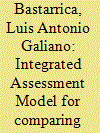| Srl | Item |
| 1 |
ID:
191298


|
|
|
|
|
| Summary/Abstract |
The decarbonisation of electricity supply poses a major milestone in the mitigation of climate change. Integrated Assessment Models (IAMs) provide a relevant instrument for the quantification and comparison of the economic and environmental impacts of various electricity decarbonisation scenarios, despite having rarely been applied to a national context. In this paper, an IAM able to calculate such impacts on the electricity sector in Spain is presented. Developed using the latest IAM modelling literature, the proposed model is able to estimate changes in temperature, climate-induced economic losses, and investment needs for climate mitigation corresponding to a range of electricity decarbonisation scenarios on a time horizon to 2050. The findings show that scenarios that undertake deeper and earlier cuts in CO2 emissions from electricity generation would achieve better welfare results, and that further reliance on fossil fuels would imply higher costs than the investment needed for renewable energy deployment in Spain. The findings constitute an insight towards the formulation of policies that address the decarbonisation of the Spanish electricity supply.
|
|
|
|
|
|
|
|
|
|
|
|
|
|
|
|
| 2 |
ID:
171389


|
|
|
|
|
| Summary/Abstract |
Integrated Assessment Models provide a framework to study sustainability transitions and their economic impacts. Models seldom consider energy constraints, taking supply availability for granted and thus suggesting a mere change in the energy mix from non-renewables to renewables. In order to address these limitations, a macro-economic module within a broader system dynamics model (MEDEAS) has been developed. The model has been run for the whole world from 1995 to 2050 under three different scenarios: Business as Usual (BAU), considering no further transition policies and keeping current trends; Green Growth (GG), undertaking the low-carbon transition according to the Paris Agreement set of policies and with high GDP growth standards; and Post-Growth (PG), testing the sustainability transition under a GDP non-growth/degrowth approach. The results reveal the conflict between economic growth, climate policy and the sustainability of resources. Whereas a BAU approach would not even be an option to achieve climate goals, a GG view would not only face the downsizing of economic output, but neither would it be able to achieve the 2 °C objective. The success of the PG approach in meeting emissions objectives suggests a redirection from economic growth policies to an industrial policy that incorporates efficiency and redistribution.
|
|
|
|
|
|
|
|
|
|
|
|
|
|
|
|
| 3 |
ID:
177146


|
|
|
|
|
| Summary/Abstract |
Nuclear is considered as a valuable option for the decarbonization of power generation, as it is a no-carbon, yet commercially consolidated technology. However, its real prospects are uncertain, especially in the OECD countries. The main aim of this work is to explore the techno-economic implications of policy-relevant scenarios for nuclear power, designed on the actual prospects in the world regions and developed with the Integrated Assessment Model WITCH.
|
|
|
|
|
|
|
|
|
|
|
|
|
|
|
|
| 4 |
ID:
166987


|
|
|
|
|
| Summary/Abstract |
Improving energy efficiency is an important strategy for reducing energy demand and carbon emissions. Numerous studies reveal that improvements in energy efficiency lead to reductions in the total energy demand and the enhancement of economic growth. However, mainstream papers have adopted top-down or bottom-up approaches to investigate energy efficiency improvements.
|
|
|
|
|
|
|
|
|
|
|
|
|
|
|
|
| 5 |
ID:
168673


|
|
|
|
|
| Summary/Abstract |
Nationally Determined Contributions (NDCs) submitted so far under the Paris Agreement are not in line with its long-term temperature goal. To bridge this gap, countries are required to provide regular updates and enhancements of their long-term targets and strategies, based on scientific assessments.
|
|
|
|
|
|
|
|
|
|
|
|
|
|
|
|